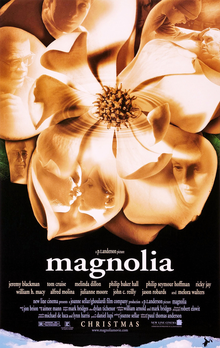Sunday night we caught, on one of the cable channels, the 1999 film by Paul Thomas Anderson, Magnolia (all but the first few minutes; we caught up on those the next night, since I have the DVD). It’s one of my favorite films of all time. I like the interwoven plot lines, the connections between them (that take a couple viewings to entirely perceive), and especially the film score by Jon Brion, propulsive and delicate and tad minimalistic, that does as much work as the writing and directing to indicate that all those plot lines are in some way similar and connected.

On the other hand, I reject the explicit message, suggested by the documentary-like prologue in the first few minutes, that mysterious coincidental events have some kind of deep intended meaning or intent; I on the other hand see all these interwoven plot threads as about the kinds of problems most people have in their lives, what some may characterize as sins and redemption, others simply as mistakes and attempts to do better and reform (since I think that all people think they are being good, in their different ways), that are all, ultimately, overwhelmed by random events of the universe that cannot be anticipated. Like frogs falling from the sky. The gun falls from the sky. We don’t notice the many similar events that might have happened; the random one that does happen is taken to mean something deep. That’s human nature.
Anderson’s idea is indicated by the the Aimee Mann song “Save Me”; the many characters are all broken (or see themselves as broken) in some way and need saving. It’s a different take on the same issue.
The score is beautiful and one of my favorite things about the film. Start here and let it autoplay through the entire soundtrack.





